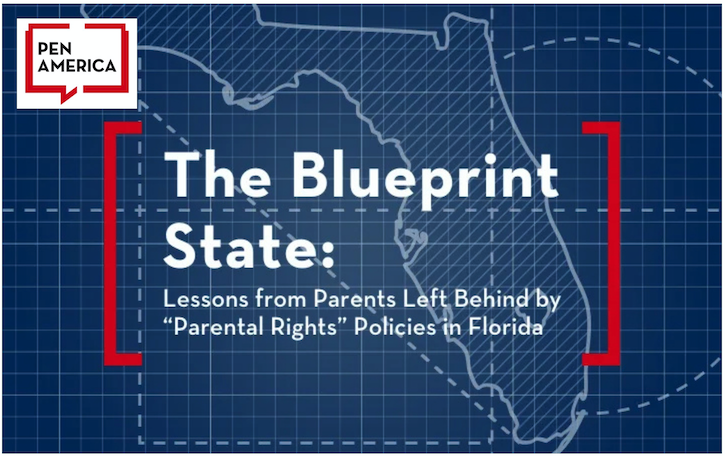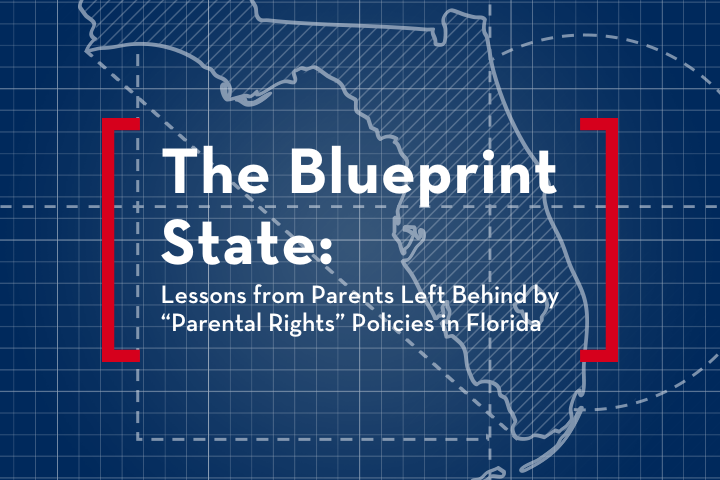PEN America Report Explores Florida's 'Parental Rights' Censorship Playbook
“Florida is a warning sign of what this country could become when we let a false narrative about ‘parental rights’ infringe on the wishes of actual parents,” the report concludes.

A new report from PEN America, co-written with the grassroots advocacy group The Florida Freedom to Read Project, is shining a light on the impact of so-called parental rights laws in Florida, and how the state has served as a lab for a host of laws and policies that have sought to impose a right-wing ideological blueprint in schools and libraries.
“Since 2021, the Sunshine State has led the country in advancing the ‘parental rights’ agenda. Contrary to its name, this agenda has used fuzzy, coded language to manufacture moral panic, and to deliver control over what students can read and learn in schools not into the hands of all parents but to a particular segment of citizens—some not even parents but community members,” the report states in the introduction. “With the advent of the second Trump Administration, the country now faces the prospect that Florida’s approach to public education will become a blueprint for federal policy.”
The new report follows up on previous PEN America reports that have cautioned that emerging “parental rights” legislation across the nation are not “common sense” measures to protect students but Trojan Horses designed to “empower a vocal and censorship-minded minority” in public education.
“After four years living under these laws as a Florida public school parent, nothing about ‘parental rights’ policies are ‘common sense’ in practice,” said Florida Freedom to Read Project (FFTRP) co-founder, Stephana Ferrell, in a statement. “Instead, it is a guise for a full-throated censorship movement that serves to remake schools and especially the experience of our students, forfeiting their rights, as well as ours as parents.”

The report details five key “reflections”:
1. “Parental Rights” Policies Subvert the Majority of Parents’ Preferences
Between 2021 and 2023 Florida lawmakers passed five state laws that have defined the state’s so-called parental rights agenda, the report states: HB 241 (2021) “The Parents Bill of Rights”, HB 1557, HB 1467, and HB 7 (all passed in 2022), and HB 1069 (2023).
“One example of how these laws have had the opposite effect of what they claim is in the implementation of the 2023 law, HB 1069,” the report points out, a law, currently being challenged in court, that, among it provisions bans books containing "sexual conduct" from school libraries pending a review process. "In practice, this means that a single parent can challenge dozens of books and have them pulled from access for everyone else, without anyone confirming that the books meet the criteria for removal. The policy prioritizes the demands of those seeking to remove books over protecting students’ freedom to read, respecting the diverse preferences of all parents in the district, or honoring the professional judgment of librarians.”
2. “Parental Rights” Policies Lead School Districts to Self-Censor
According to the report, the Seminole County Public Schools removed more than 140 titles and placed restrictions on more than 30 other titles over the previous school year. “But, the choice to ban these titles were not triggered by any formal objection to them by local parents or citizens,” the report states. Instead, the actions were prompted by an “audit” of the school library’s collection under Florida HB 1467, and “driven in large part” by activism from the county’s local Moms for Liberty chapter.
“As seen in Seminole, HB 1467 has helped accelerate the ability of parents to ban books, even in districts where they do not have children in the schools, effectively catering to the minority of parents who want to censor them—wherever they are located—despite the majority of local parents who want to maintain broad access to literature for their students,” the report states. “It has also put pressure on district leaders to self-censor their library collections in advance of or in response to any challenges, no matter where they originate within the state.”
3. “Parental Rights” Policies Favor Censorship Advocates, Whether They’re Parents or Not
The report cites the Santa Rosa County Schools where more than 50 books have been on hold for over a year, awaiting a committee review, with many of the objections that landed the books on hold coming from a single Florida resident living in a neighboring county, "who has filed over 200 objections in her school district, Escambia County Public Schools.”
This has happened despite the passage of HB 1285, a bill that was supposed to limit the ability of individuals to broadly challenge books in other counties, but which apparently includes easy workarounds. In Santa Rosa, for example, the individual "obtained power of attorney for some Santa Rosa residents that allowed her to submit objections on their behalf."
4. "Parental Rights” Policies Prioritize Caution Ahead of Students’ Education
In 2023, the report notes that the Florida Board of Education approved a required training and certification for librarians and media specialists that encouraged them to “err on the side of caution while selecting materials” for their school library collections.
“This in turn has created a system where the ideological preferences of the state have become the de facto opinions of educators. In other words, in practice, ‘parental rights’ rhetoric has meant educators must practice extreme caution, catering to the most restrictively-minded,” the report explains. “In turn, this means that actual parent input has been curtailed or completely cut out of the process of reviewing books their students can access in schools.”
5. “Parental Rights” Policies Codify the State’s Ideological Preferences
According to the report, before the passing of HB 1069 in 2023, Orange County had annually approved a comprehensive sex education curriculum at the middle school level that included a range of topics, including consent, sexual violence, contraception, and prenatal development, in addition to an abstinence-focused message.” But following the adoption of HB 1069, "the state failed to approve the county’s curriculum," leaving Orange County students without any formal instruction on puberty and sexual health for the 2023-2024 school year.
“In reflecting on these developments, it’s important to remember that Orange County has a locally elected school board responsible to residents in that district,” the report observes. “This insistence by the state to reject locally-approved curriculum diminishes the choices and voices of local parents and voters. In these districts, a parent’s ability to influence their children’s education has been diminished, as government entities are actually limiting it.”
The report closes with a list of action items advocates can use to stay informed and to push back on such policies.
“Florida is a warning sign of what this country could become when we let a false narrative about ‘parental rights’ infringe on the wishes of actual parents,” the report concludes. “We should not let the Sunshine State become the blueprint for public education across the country.”



